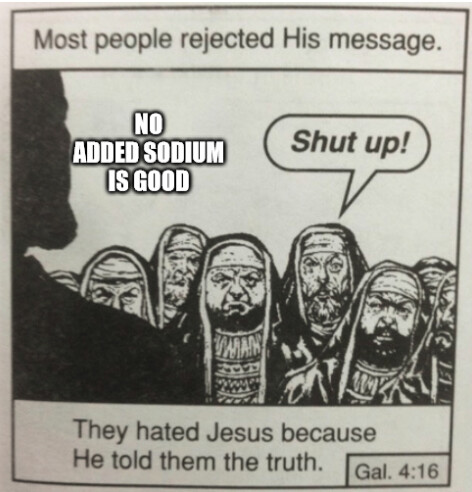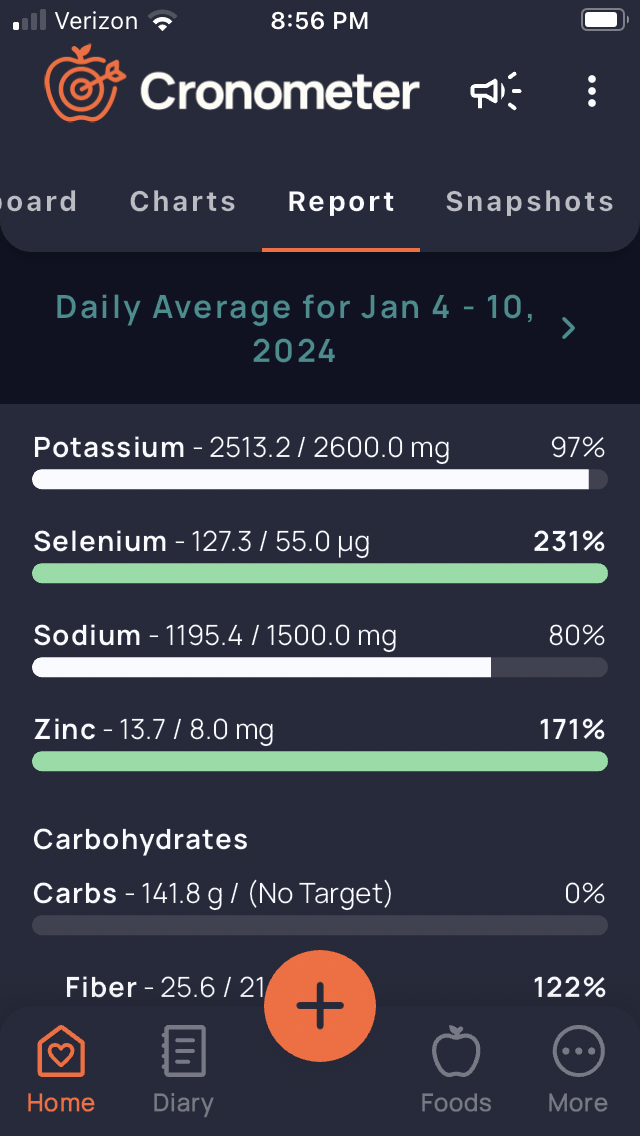blsm
#41
This thread is fascinating, thank you @A_User. I did a low sodium diet for a year and I actually prefer it. I found the only way it works is to basically eat a whole/unprocessed foods diet. This became quite a challenge when I changed jobs so I ultimately got away from it although I still try my best to be mindful of not overdoing salt. I do not add salt to anything. Once adapted to a low salt diet I noticed it would be uncomfortable for a day or two if circumstances took me off plan because of the resulting swelling.
2 Likes
A_User
#43
Yes, I think I feel better on a low sodium diet, with some possible side effects that I can mitigate in other ways. I will have to gather more data. I think it seems very promising.
Yes that’s the average sleeping HRV.
2 Likes
blsm
#44
I seem to recall there being an adjustment period but I don’t recall specifically how long. It did counter intuitively resolve my electrolyte imbalance symptoms pretty quickly which was my goal. I was operating under an appeal to nature perspective (fallacy?) at the time since medicine had failed to provide any adequate explanation or treatments that I was willing to continue long term. The good news is that after starting rapa and going back to my old hospital job which resulted in a higher sodium intake the issue didn’t return. Now that I’ve finished that work assignment I’m going to go back to the low sodium diet simply because I felt and looked better when keeping it low.
1 Like
A_User
#45
The mental barrier is how food tastes. I had some soup and the immediate comparison is with sodium laded food ‘this doesn’t taste the same as that’. Meanwhile, I could eat it, there is no rejection like if the food was bitter or tasted poisonous. And there’s plenty of different tastes, once I paid attention to it, that was interesting, since we are so used to sodium. Everyone should try if they are able to a very low sodium diet, but I don’t know the long-term results.

2 Likes
blsm
#46
I actually adjusted to the taste difference within a week or two but maybe I was just motivated by feeling better. I still prefer the taste of low sodium/no added salt food and never really readjusted to the taste of high salt foods. I think the year of eating low sodium permanently altered my taste for it. It was certainly the only time in my life I had eaten low salt since I was raised on things like canned Campbell’s chicken noodle soup!
1 Like
blsm
#47
@A_User, how’s the lower sodium going for you? I’ve cut mine by more than 1/2 over the last week but I’m still just slightly above 1500mg. It’s a little harder than I anticipated because in the last 6 months I pretty dramatically changed my diet to lower fat and a couple of my staples have higher naturally occurring sodium than I realized so I’m fine tuning things yet again. Not adding any salt to meals/cooking or eating anything processed with added salt still gets me to 1500 easily at this point. I do feel a little better though so it seems worth the effort for me personally. My last high day was 12/29/23 at 3600mg and my average for the last 7 days is 1551mg.
LaraPo
#48
I also don’t eat added sodium in my cooked food. But I eat bread and cheese, sometimes pizza, and there’s sodium. How to calculate how much sodium I consume per day?
1 Like
scta123
#49
If you use nutritional tracker like myfitnesspal or mynetdiary it does the calculation and tracking for you.
1 Like
blsm
#50
I’ve been using something similar to @scta123 but it’s called cronometer.
3 Likes
A_User
#51
I was traveling for a bit so I wasn’t following the diet but I’ll go back at it now. I didn’t notice any difference over one day of low sodium, but I wasn’t hydrating particularly well. They both seem to go together.
1 Like
blsm
#52
Thank you, It’s nearly impossible to do while traveling unless a person is basically fasting!
medaura
#53
I don’t know guys. Sodium is a macronutrient. You want to watch serum levels to not get high but that doesn’t mean limit the intake. It means hydrate well. Vegetables don’t have much of it nor does meat. You need literal salt added. But salt is only 11% of the typical American’s dietary intake. The bulk of it comes through processed food. So if you switch to a whole food diet, cooking vegetables and meat from scratch and such, you need to use it even more heavily in your cooking. So I salt to taste and don’t obsess.
9 Likes
A_User
#54
The Yanomamo Indians seem to be thriving on a no added sodium diet though, their BP doesn’t increase with age, and they are exercising a lot. We didn’t eat added sodium in our evolutionary past.
3 Likes
medaura
#55
I’m going to go out on a limb and assume they eat a lot of meat. That’s a natural source of sodium. So on a carnivore diet you may not need extra. Lower meat diets though? Where will it come from naturally?
A_User
#56
I don’t think there’s a lot of sodium in meat. I think most of their calories come from crops they grow, but of course some from hunting.
I think a healthy body can refrain from giving up sodium if there’s a shortage, it doesn’t make sense otherwise. The problem with marathon runners they’ve run into is when they drink a lot of water in a short period of time while not replenishing sodium reserves, meaning they cause an electrolyte imbalance. Maybe the WHO minimum of 500 is probably wise to target, absent of more information at the moment.
2 Likes
i just recorded an interview with Dr. Rick Johnson, a kidney doctor who has become famous for his research into fructose and uric acid. He says, do not let yourself get dehydrated or you will accumulate damage in your kidneys over time. Once you have damaged (lower functioning) kidneys, you need to keep the sodium (and sugar) low. Of course, many things impact kidney function, but this post is about sodium.
5 Likes
A_User
#58
Problem is sodium might dehydrate you, especially if eaten late at night or in general after a meal. There’s thirst for a reason after high sodium - dehydration from sodium that needs to be diluted out?
1 Like
blsm
#59

Here’s my average for the past week. I’m doing labs in about 3 weeks so we’ll see how it goes. I’m feeling good so far. The last time I did it I was carnivore and it went well for me then.
4 Likes
A_User
#60
I’ve tried low sodium diet enough that I’m pretty confident I have the following benefits, it happens every time I switch:
+decreased anxiety, sense of calm
+improved energy
+improved cognition, my eyes move faster, improved reactions
+slight sense of extra wellbeing
+feel grounded, as if my spatial perception slightly improve
+decrease thirst
+decrease aftertaste of food
+faster hydration
Probably has to do a lot with hydration.
No negatives except objective markers like increased HR etc at certain times, but I don’t care, if my brain works much better.
5 Likes